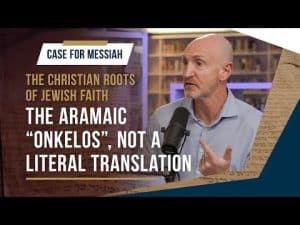Peter was Jewish, but to whom was he addressing his letters? A mixed congregation of Jews and Gentiles? Or a group of Jewish believers? If he was addressing a Jewish audience in his first letter, there are some major implications. We intend to show you that he was, and why understanding this is important for all believers, Jews and Gentiles alike, together in Messiah.
Click here for the original article by Jim R. Sibley as it appears in The Southwestern Journal of Theology, with more detailed arguments and full documentation.
“The correct identification of Israel is a key to the true interpretation of the whole Bible. If Israel means God’s ancient people, the Bible becomes as clear as truth itself. If Israel means the New Testament church, the teaching of the Bible becomes obscure.” W. A. Criswell 1
Correctly understanding the ongoing place of Israel unlocks greater meaning in the Bible, giving new dimensions to words and stories that may have become written off as purely figurative. However, when we see how serious God is in His dealings with His people, how extremely faithful He is to every word, the Scriptures become more alive and relevant than ever before – both to the Jew, and to the Gentile. God does not end His relationship with Israel on the arrival of the New Covenant, but His words to His Jewish remnant in 1 Peter show that there is still more to come. The continued relationship between God and Israel is a guarantee of the promised future restoration; a restoration that will bless the whole earth. 1 Peter 2:4–10 reads as follows:
And coming to Him as to a living stone which has been rejected by men, but is choice and precious in the sight of God, you also, as living stones, are being built up as a spiritual house for a holy priesthood, to offer up spiritual sacrifices acceptable to God through Jesus Christ. For this is contained in Scripture: “Behold, I lay in Zion a choice stone, a precious corner stone, and he who believes in Him will not be disappointed.” This precious value, then, is for you who believe; but for those who disbelieve, “The stone which the builders rejected, this became the very corner stone,” and, “A stone of stumbling and a rock of offense”; for they stumble because they are disobedient to the word, and to this doom they were also appointed.
But you are a chosen race, a royal priesthood, a holy nation, a people for God’s own possession, so that you may proclaim the excellencies of Him who has called you out of darkness into His marvelous light; for you once were not a people, but now you are the people of God; you had not received mercy, but now you have received mercy.
Scott McKnight claims,“There is no passage in the New Testament that more explicitly associates the Old Testament terms for Israel with the New Testament Church than this one.”2 John S. Feinberg claims that the references to a ‘holy nation,’ ‘chosen people,’ and ‘royal priesthood’ in 1 Pet 2:9 are clearly references to the church.3 For him the matter is settled, but is it? And what difference does it make if Peter is addressing a Jewish audience?
Theologians throughout the ages concluded it was written to Jews
A straightforward reading of the text indicates that the recipients were Jewish Christians. Karen H. Jobes maintains that “in contrast to modern interpreters, most ancient exegetes . . . understood the recipients of the letter to be converts from Judaism.”4 Ramsey Michaels admits that the readers “are addressed here as Jews.” He insists, “No NT letter is so consistently addressed, directly or indirectly, to ‘Israel,’ that is (on the face of it) to Jews.”5 He nevertheless concludes that “1 Peter was written primarily to Gentile Christians in Asia Minor, but that the author, for his own reasons, has chosen to address them as if they were Jews.” He adds, “So successful was the author of 1 Peter in appearing to write to Jews that the Christian historian Eusebius in the fourth century A.D. took him at his word.”
Indeed, there is a long line of commentators who have also taken Peter at his word. Edward Gordon Selwyn says, “In the patristic age Origen, Eusebius, and the Greek Fathers generally maintained that they [i.e., the recipients] had been Jews, while Augustine, Jerome, and other Latin writers held the opposite view.”6 He continues to suggest that due to the weight of Erasmus, Calvin, Bengel, and Grotius, it might not be improper to say that for centuries the consensus view was that the epistle was written to Jewish Christians. John Calvin, writing in the 1550s claimed that the recipients were Jewish Christians. Robert Leighton, writing in the 1650s believed that they were Jewish Christians. John Lightfoot, writing in 1679 agreed that the recipients were Jewish Christians. In fact, he found it incredible that anyone would deny that 1 Peter was addressed to Jewish believers. He asked rhetorically, “who indeed doth deny it?”
Clues in the text that tell us Peter is writing to Jews
The Description of a Former Life (1:14, 18). In 1:14 and 18, Peter refers to his readers’ former lives with the following phrases: “the former lusts which were yours in your ignorance” and “your futile way of life inherited from your forefathers.” It is argued that Diaspora Jews of the first century could never have been described in such spiritually bankrupt terms and that the ways of Judaism would never have been described as a ‘useless way of life.’ Therefore, most interpreters today conclude that the original recipients must have been Gentile converts.
In 1:18, Peter refers to their formerly “futile way of life inherited from [their] forefathers.” The word used here, πατροπαραδότου (lit., father-traditions, or traditions of the fathers) is unique in the New Testament, but there are many similar references to the “traditions” of the Pharisees, of the elders, or simply of men. This oral law of the Pharisees had been passed down for a number of generations, and both Jesus and Paul actively opposed it. For example, Jesus referred to “the tradition of the elders” (Mark 7:3), and He claimed that these traditions caused the Pharisees and scribes to “transgress the commandment of God” (Matt 15:3) and “invalidate the word of God” (Matt 15:7). Paul also refers to “the ancestral traditions.” He says of himself (Gal 1:14), “and I was advancing in Judaism beyond many of my countrymen, being more extremely zealous for my ancestral traditions” (τῶν πατρικῶν μου παραδόσεων). Here is Saul, “a Pharisee, a son of Pharisees” (Acts 23:6), describing his formerly futile way of life by speaking of his zeal for the traditions of his ancestors. His testimony should count for something, as well. This terminology in 1:18 is perfectly consistent with a Jewish audience.
Ignorance? Lusts of the flesh? How could these be sensibly applied to a Jewish audience? In Isaiah 1:3, God says, “An ox knows its owner, and a donkey its master’s manger, but Israel does not know, My people do not understand.” In the New Testament, Paul affirms the same truth about Jewish unbelievers when he says, “For I bear them witness that they have a zeal for God, but not in accordance with knowledge. For not knowing about God’s righteousness, and seeking to establish their own, they did not subject themselves to the righteousness of God” (Rom 10:2–3). Of his own life before he met the Messiah, he says, “I was shown mercy, because I acted ignorantly (ἀγνοῶν) in unbelief” (1 Tim 1:13). Ιt is also interesting that Peter and John are described in Acts 4:13 as “uneducated and untrained” (ἀγράμματοί. . . καὶ ἰδιῶται). Peter called out to his Jewish brethren at Pentecost, “And now, brethren, I know that you acted in ignorance [κατὰ ἂγνοιαν], just as your rulers did also” (Acts 3:17). Here the very same Peter who later would write 1 Peter 1:14 is addressing, not Diaspora Jews or “lapsed Jews,” but Jerusalem Jews who were in the very precincts of the temple, and he says they acted in ignorance, even as the leaders of the nation! This usage is exactly parallel with what he says in 1 Peter 1:14. This should remove any hesitancy about the applicability of this term to the Jewish people in this context.
Paul, in Ephesians 2:3, says “we too all formerly lived in the lusts (ἐπιθυμίαις) of our flesh, indulging the desires of the flesh and of the mind, and were by nature children of wrath, even as the rest.”
The Description of a Change in Status (2:10).
For you once were not a people, but now you are the people of God; you had not received mercy, but now you have received mercy.
Once again, taking a backward glance, Peter describes his readers’ former status to contrast it with a change that has taken place.This certainly sounds as if it would apply to a Gentile readership, and indeed it might, but it is an allusion to Hosea 1–2, where it has reference to Israel.
And the Lord said to him, “Name her Lo-ruhamah [has not received mercy], for I will no longer have mercy on the house of Israel, that I would ever forgive them. But I will have mercy on the house of Judah and deliver them by the Lord their God, and will not deliver them by bow, sword, battle, horses or horsemen.”
When she had weaned Lo-ruhamah, she conceived and gave birth to a son. And the Lord said, “Name him Lo-ammi [not my people], for you are not My people and I am not your God.” (Hosea 1:6-9)
In the context, God is speaking of the alienation of Israel from fellowship with Him. It is not that the covenantal relationship is broken, but that a functional relationship is not in place. The thought that this verse could refer to Gentile Christians is termed “very odd” by Witherington, “where Hosea is clearly speaking of and about Jews, and offering a prophetic critique of their behavior.”7 By the way, the Greek text says, οἳ ποτε οὐ λαὸς νῦν δὲ λαὸς θεοῦ (lit., “who once were not a people, but now are a people of God”). The translators have supplied the definite article, so that it reads, “the people of God,” but it is not in the original. Hosea is not presenting Israel as having broken the Mosaic Covenant, such that they were no longer the covenant people, but that although they were alienated from their God, He would overcome their rebellion, master their willfulness, and bring them to Himself (e.g., see Hos 1:10–11; 2:6–7, 14–23). This is the experience of Peter’s recipients. As unsaved Jews, living a “futile way of life inherited from [their] fathers” (1:18), they have now been redeemed “with the precious blood as of a lamb unblemished and spotless, the blood of Christ” (1:19), to join the remnant of Israel. As such, they are the token and guarantee of the nation’s future salvation (Rom 11:16, 26). The emphasis is on God’s ability and resolve to restore the relationship and overcome Israel’s defection. Because of the change in status described in verse 10 (“now you are the people of God . . . now you have received mercy”), the descriptive phrases of verse 9 make perfect sense. Peter tells his original readers,
“But you are a chosen race, a royal priesthood, a holy nation, a people for God’s own possession, so that you may proclaim the excellencies of Him who has called you out of darkness into His marvelous light.” (v9)
The church is never referred to as a “race” or a “nation.”
The church is to be composed of many ethnicities and many nations. These verses have reference to the remnant of Israel that has put its trust in Jesus, the Messiah of Israel. What has not yet been actualized in the nation, God is doing in the remnant. He is making them all that Israel was to have been and therefore a foretaste of what the nation will be one day.
But wait a minute, isn’t that for all believers? Aren’t we all priests now? Yes, we are.
The priesthood of the believer is actually a phrase that suggests a cluster of related doctrinal truths, including the perspicuity of Scripture, soul competence, the essential equality of believers in the church, and the effectual prayer of the believer. Each of these can be fully justified on the basis of other texts. Certainly, these truths are not dependent upon 1 Peter 2:9–10!
But what is lost when the priesthood of the believer is based upon this passage is its original significance regarding the remnant of Israel.
Supersessionism struggles to stay coherent if 1 Peter was written to Jews
God has chosen the people of Israel for His purposes, just as He appointed non-believing individuals to do his will, such as Nebuchadnezzar and Cyrus. His purpose has always been to bless all the peoples of the earth through Israel, and He has not discarded or rejected His people, and neither has He finished all that He promised to do. Watching how God deals with and speaks to His people in the Bible shows that God is unchanging and true, gracious and compassionate, even when we fail. He still keeps His side of the bargain.
In today’s world, God’s dealings with the Jewish people on the stage of current events, drawing them back from the four corners of the earth to the Land of Israel and to their own state, and the rapidly growing numbers of Jewish believers in Yeshua (Jesus) increasingly amplify the cognitive dissonance inherent within supersessionist theology.8 If it were ever possible to make a credible case that the Jewish people were no longer uniquely relevant to God’s purposes, that possibility is rapidly eroding.
When 1 Peter is read in light of an original audience of Jewish believers in Jesus, nothing is lost, but much is gained. Reading this letter “over the shoulders” of the Jewish believers to whom it was originally addressed is deeply instructive for all believers today. Peter writes these Jewish believers as they are experiencing escalating persecution from both Jews and Gentiles, and he encourages them to endure faithfully and victoriously by living holy lives and by keeping their focus on Jesus, the Messiah, who died for them.
[1] W. A. Criswell, “Israel in the Remembrance of God,” booklet (Dallas, TX: Pasche Press, 2006), 4.
[2] Scott McKnight, 1 Peter, NIV Application Commentary (Grand Rapids: Zondervan Publishing House, 1993), 109–10.
[3] John S. Feinberg, “Systems of Discontinuity” in Continuity and Discontinuity; Perspectives on the Relationship Between the Old and New Testaments: Essays in Honor of S. Lewis Johnson, Jr., ed. John S. Feinberg (Westchester, IL: Crossway Books, 1988), 72.
[4] Karen H. Jobes, 1Peter, Baker Exegetical Commentary on the New Testament (Grand Rapids: Baker Academic, 2005), 23.
[5] J. Ramsey Michaels, 1 Peter, Word Biblical Commentary, vol. 49 (Waco, TX: Word Books, 1988), xlviii-xlvi
[6] Edward Gordon Selwyn, The First Epistle of St. Peter, 2nd ed, Thornapple Commentary (Grand Rapids: Baker, 1981), 42.
[7] Witherington, 28. Emphasis in the original.
[8] Supersessionism is often popularly referred to as Replacement Theology. Some authors deny they espouse supersessionism, yet redefine Israel in such a way that the church ends up as the “new Israel.” Others claim that Jesus fulfilled all that Israel was to be; therefore, all who are in Him constitute the “true Israel.” All such maneuvers in which Israel becomes the church are included under the term “supersessionism.” For more on supersessionism, see, e.g., Darrell L. Bock, “Replacement Theology with Implications for Messianic Jewish Relations,” in Jesus, Salvation and the Jewish People: The Uniqueness of Jesus and Jewish Evangelism, ed. David Parker (Milton Keynes, UK: Paternoster, 2011), 235–47; Ronald E. Diprose, Israel and the Church: The Origins and Effects of Replacement Theology (Milton Keynes, UK: Authentic Media, 2000); Barry E. Horner, Future Israel: Why Christian Anti-Judaism Must Be Challenged, NAC Studies in Bible & Theology (Nashville, TN: B & H Academic, 2007); R. Kendall Soulen, The God of Israel and Christian Theology (Minneapolis, MN: Augsburg-Fortress Press, 1996); and Michael J. Vlach, Has the Church Replaced Israel? A Theological Evaluation (Nashville, TN: B & H Academic, 2010).
Read the article in full here
Photo by Kelly Sikkema on Unsplash














